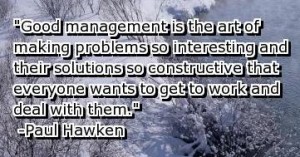Knowing why, when, and how to say no at work is essential to your career success and work life balance. We may not want to say no at work for fear of not being liked or worse – being fired. This is simply NOT TRUE especially when you learn how to say no tactfully. Before we can talk about how to say no, let’s get on the same page about why and when you should be saying no at work and how this can benefit both you and your employer. ...
What Makes a Good Manager – 7 Qualities
What makes a good manager? This is an excellent question to ask as you are getting promoted to manage others or have already been managing for awhile. There are many managers out there but few are good ones. The goal of a good manager is to achieve stellar results (results you cannot achieve alone) through inspiring, leading, and developing your team. ...
How to Network for a Job
To succeed like an executive, you not only need to know how to excel at your current job, but also need to know when it’s time to leave and how to best find your next job. Most people has at least 8 to 10 jobs in their lifetime. Don’t wait until you know you want to leave a job to start job search. It’s important to network early and often while still at work in order to find a great next job. ...
How to Recognize Good Management During Job Search
Good management is hard to find and recognize. Here is a 10 minutes one-on-one coaching discussion I had with a job seeker on how to best recognize whether a company has good management while she is interviewing with the company. She has 10+ years of experience and so far has had mixed experiences with good and bad management in the last 4 jobs she held. ...
Good Management – How to Recognize it During Job Search?
How to recognize whether a company has good management during job search? What a great question from a reader and a very relevant one to ask for any job seekers. Working for good management is essential to your job success and happiness at work. It is however hard to decipher whether a company has good management from the outside, during your job search. ...
Should I Interview While Pregnant?
Should I interview while pregnant? The answer is Yes, absolutely. I am learning this first hand as I am 6 months pregnant with my second child and currently in between consulting contracts. You may say, no one will hire me while I am pregnant, so why bother. I had the same perspective at first but am finding real benefits in looking for a job while pregnant. ...
Are You Overworking? 4 Tips on How to Stop
If you are overworking, you are not alone. Here are some statistics on how hard Americans work today (see detailed infographics at the end of this post):
- Over 75% of Americans work more than 40 hours a week, and about 10 million Americans work more than 60 hours a week.
- 10% of worker take work home every other day, and 24% of workers think about work at home or at social events.
- 1 in 3 American adults don’t take their vacation days.
Being overworked comes at a price to the employee and the company they work for – increased chances of disease, less time with family, disturbed sleep, more stress, and less productivity. ...





